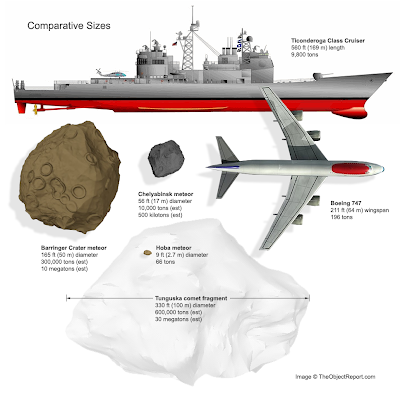A "dash-cam" image of the bolide over Chelyabinsk
A Star Falls on RussiaLast Friday I slept-in, having had the evening watch the night before. My alarm woke me at 0900 and half-an-hour later I was walking out the base gate, walking in the chilled morning air to my favorite coffee shop on Rt 36, "Jersey Shores Coffee Roasters". Not that I drink coffee, mind you--this little cafe simply has the best Wifi within easy walking distance of the Weapons Station; twenty minutes' stroll brought me to the little blue building with the yellow roof and the somewhat incongruous (to me, at any rate) mural of a surfer "hanging ten" on the exterior wall.
Ordering English Breakfast and an onion bagel I settled down at my usual table and booted-up my laptop to check email and see what was going on in the world. At this point I must explain that I strongly dislike television (Lucy and I don't even own one) and usually get my news online. No, it isn't any kind of religious issue; I simply abhor the endless commercials and infantile chatter which is part of practically every "news" program.
As soon as I logged-in, I was stunned by the news from Russia; whilst I'd slept a large meteor had entered the atmosphere over the Urals, passing high above the city of Chelyabinsk as a brilliant fireball, or "Bolide". The shock wave of it's passage had shattered windows and some structures in the city and outskirts, and roughly a thousand people of "Tankograd" (a nickname bestowed upon Chelyabinsk during the 'Great Patriotic War" because of the enormous number of tanks and other armored vehicles produced by the city for the war against Hitler's invading armies) were injured, mostly by broken glass as unprecedented "sonic boom" rocked the city.
A twenty-foot diameter "crater" in a frozen lake near Chelyabinsk
Watch for Falling Rocks
When I returned to Supply I actually spent some time watching TV--partly to keep abreast of updates from Russia, and partly because another asteroid was in the news, a football-field-sized rock that in mid-afternoon passed Earth only 17,000 miles above Earth's surface. Were the Russian bolide and "2012 ad14" related in some way, perhaps part of some kind of "asteroid shower"? No, it seems not; the bodies were traveling along very different orbital paths around the Sun, and their arrival in our planetary neighborhood on the same day seems to be just an astronomical co-incidence. Pardon the pun.
A nice comparison diagram
As I followed the coverage of the Chelyabinsk story I found myself experiencing some profoundly mixed emotions. Concern for the injured, of course, and relief that there appear to have been no deaths resulting either directly or indirectly from the event. Sympathy for the people of the city, confronted by a phenomenon outside their experience, who feared for themselves and loved one, and for those who honestly thought that the "end" had come. And of course fascination with the enormous number of usable video and audio recordings that will provide scientists with vital data on the behavior of large meteors. But there is also another reaction...
Asteroid Envy
Yes, following the reportage and commentary on Friday and since I have been found myself overwhelmed at times by the "green-eyed monster" known as jealousy. I feel like a little boy whose friends all got bicycles while he got a sweater, simply because I couldn't be there to see such a magnificent sight as the people of a faraway Russian city were treated to!
Understand now, I have seen (conservative estimate here) tens of thousands of meteors over the past forty years of stargazing. Most were your garden-variety "shooting star" appearing to streak across a few degrees of sky and then vanish, some thousands were seen while watching meteor "showers", a hundred or so chanced to cross the field of telescope or binocular, and only a few dozens can actually be called bolides, bright fireballs that crossed the sky leaving fading trails behind and faint afterimages in my eyes.
At every opportunity, whether on land or at sea, I have kept my eyes on the sky, seeking always that random flash of light that signals the breakup of a fragment of asteroid or comet in the upper atmosphere, the addition of an infinitesimal bit of mass to Earth. I have watched, and seen wonders in the display of nature's fireworks, but I've never observed, and know well how unlikely it is that I ever will, anything approaching the "100-Year" fireball that the good people of Chelyabinsk saw last week!
Eyes on the Sky
But I'll keep looking. As statistically unlikely as it may be, I'll continue be out there on every clear night, waiting and watching for that flash of light that rivals the sun and drowns the full moon with it's radiance, for that trail of fire across the sky, for the hypersonic "boom" that heralds the arrival of a mass of asteroidal rock, a fragment of cometary nucleus. Oh yes, I'll keep looking.
And I'll make you a solemn promise now. If it happens that I miss my "100-Year" fireball, whether I happen to be inside the house having dinner with Lucy or within the "skin" of whatever ship I am sailing at the time; if my watch schedule has me sleeping when that visitor from space arrives. Whatever the reason why I miss my bolide, whatever the excuse, I can promise you that it won't be that I was watching TV at the time!



No comments:
Post a Comment